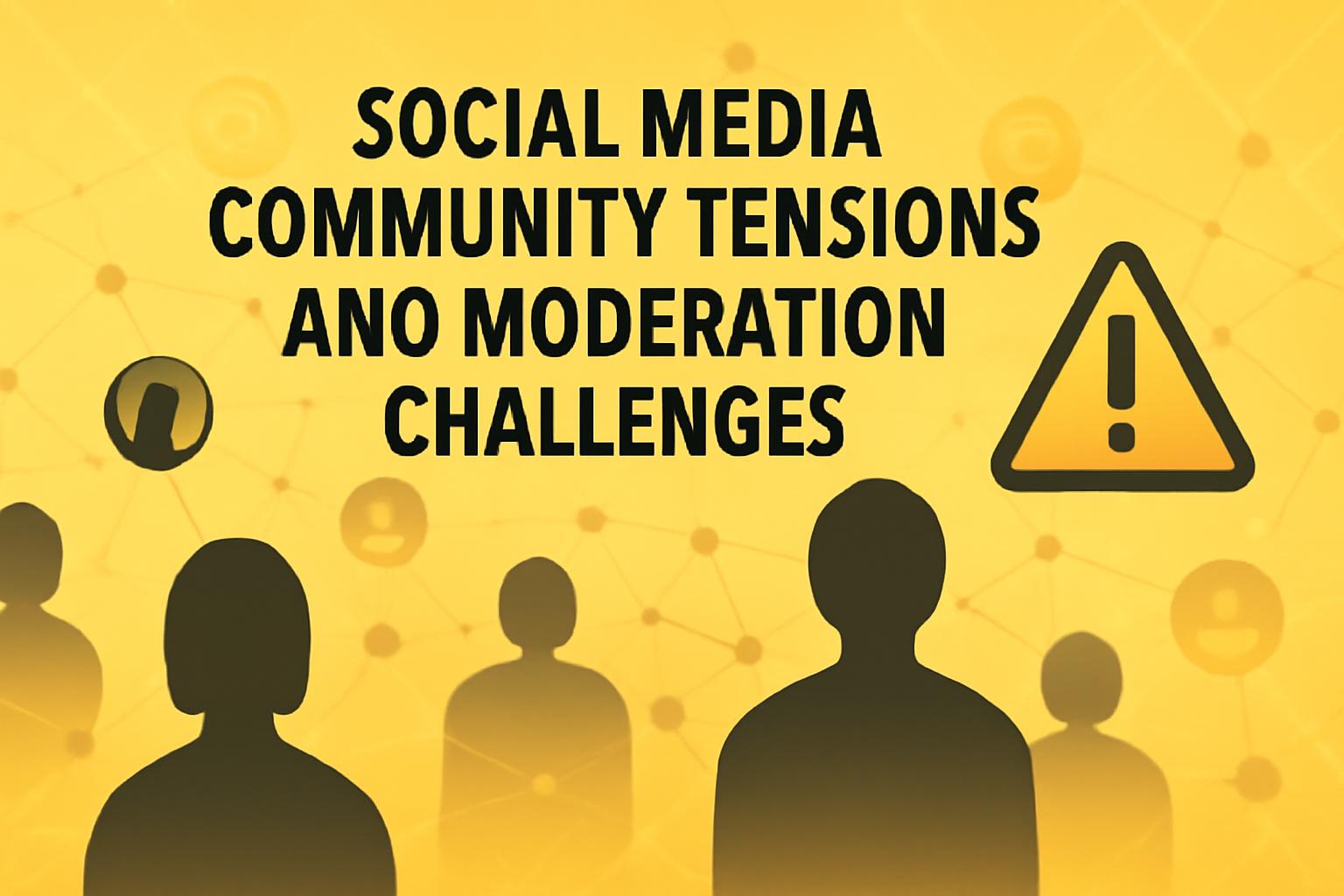The ongoing waffle-themed controversy on Bluesky is more than a humorous meme cycle; it exposes fundamental tensions in social media governance, community identity, and platform moderation. Bluesky’s decentralized approach offers a novel framework but also presents challenges in maintaining a cohesive and safe user environment. !-- wp:paragraph -->
- Opportunities: Leveraging decentralization to empower user-led moderation could differentiate Bluesky in a crowded social media market.
- Risks: Perceived inconsistent enforcement of community guidelines risks alienating marginalized users and damaging platform reputation.
- Challenges: Balancing free speech with community safety remains a complex, ongoing struggle for Bluesky leadership.
- Potential: The healthy discourse project may improve interaction dynamics if effectively implemented.
FinOracleAI — Market View
The ongoing waffle-themed controversy on Bluesky is more than a humorous meme cycle; it exposes fundamental tensions in social media governance, community identity, and platform moderation. Bluesky’s decentralized approach offers a novel framework but also presents challenges in maintaining a cohesive and safe user environment. !-- wp:paragraph -->- Opportunities: Leveraging decentralization to empower user-led moderation could differentiate Bluesky in a crowded social media market.
- Risks: Perceived inconsistent enforcement of community guidelines risks alienating marginalized users and damaging platform reputation.
- Challenges: Balancing free speech with community safety remains a complex, ongoing struggle for Bluesky leadership.
- Potential: The healthy discourse project may improve interaction dynamics if effectively implemented.
“We’re system architects at core. We built a decentralized network so you could run your own moderation,” Graber noted, underscoring the platform’s foundational philosophy.
Her vision anticipates potential conflicts with company leadership, famously describing the company as a “future adversary” in Bluesky’s founding documents—signaling that users should have the freedom to migrate if dissatisfied. !-- wp:paragraph -->FinOracleAI — Market View
The ongoing waffle-themed controversy on Bluesky is more than a humorous meme cycle; it exposes fundamental tensions in social media governance, community identity, and platform moderation. Bluesky’s decentralized approach offers a novel framework but also presents challenges in maintaining a cohesive and safe user environment. !-- wp:paragraph -->- Opportunities: Leveraging decentralization to empower user-led moderation could differentiate Bluesky in a crowded social media market.
- Risks: Perceived inconsistent enforcement of community guidelines risks alienating marginalized users and damaging platform reputation.
- Challenges: Balancing free speech with community safety remains a complex, ongoing struggle for Bluesky leadership.
- Potential: The healthy discourse project may improve interaction dynamics if effectively implemented.
“We’re system architects at core. We built a decentralized network so you could run your own moderation,” Graber noted, underscoring the platform’s foundational philosophy.
Her vision anticipates potential conflicts with company leadership, famously describing the company as a “future adversary” in Bluesky’s founding documents—signaling that users should have the freedom to migrate if dissatisfied. !-- wp:paragraph -->FinOracleAI — Market View
The ongoing waffle-themed controversy on Bluesky is more than a humorous meme cycle; it exposes fundamental tensions in social media governance, community identity, and platform moderation. Bluesky’s decentralized approach offers a novel framework but also presents challenges in maintaining a cohesive and safe user environment. !-- wp:paragraph -->- Opportunities: Leveraging decentralization to empower user-led moderation could differentiate Bluesky in a crowded social media market.
- Risks: Perceived inconsistent enforcement of community guidelines risks alienating marginalized users and damaging platform reputation.
- Challenges: Balancing free speech with community safety remains a complex, ongoing struggle for Bluesky leadership.
- Potential: The healthy discourse project may improve interaction dynamics if effectively implemented.
Decentralization as a Moderation Strategy
Graber has consistently emphasized Bluesky’s decentralized architecture as a core feature. This design allows users to curate their own moderation experiences and build alternative communities atop the protocol. !-- wp:paragraph --> In the midst of the waffle controversy, Graber highlighted ongoing efforts to improve discourse through what she calls the “healthy discourse project,” aimed at addressing interaction patterns that fuel conflict on the platform. !-- wp:paragraph -->“We’re system architects at core. We built a decentralized network so you could run your own moderation,” Graber noted, underscoring the platform’s foundational philosophy.
Her vision anticipates potential conflicts with company leadership, famously describing the company as a “future adversary” in Bluesky’s founding documents—signaling that users should have the freedom to migrate if dissatisfied. !-- wp:paragraph -->FinOracleAI — Market View
The ongoing waffle-themed controversy on Bluesky is more than a humorous meme cycle; it exposes fundamental tensions in social media governance, community identity, and platform moderation. Bluesky’s decentralized approach offers a novel framework but also presents challenges in maintaining a cohesive and safe user environment. !-- wp:paragraph -->- Opportunities: Leveraging decentralization to empower user-led moderation could differentiate Bluesky in a crowded social media market.
- Risks: Perceived inconsistent enforcement of community guidelines risks alienating marginalized users and damaging platform reputation.
- Challenges: Balancing free speech with community safety remains a complex, ongoing struggle for Bluesky leadership.
- Potential: The healthy discourse project may improve interaction dynamics if effectively implemented.
Decentralization as a Moderation Strategy
Graber has consistently emphasized Bluesky’s decentralized architecture as a core feature. This design allows users to curate their own moderation experiences and build alternative communities atop the protocol. !-- wp:paragraph --> In the midst of the waffle controversy, Graber highlighted ongoing efforts to improve discourse through what she calls the “healthy discourse project,” aimed at addressing interaction patterns that fuel conflict on the platform. !-- wp:paragraph -->“We’re system architects at core. We built a decentralized network so you could run your own moderation,” Graber noted, underscoring the platform’s foundational philosophy.
Her vision anticipates potential conflicts with company leadership, famously describing the company as a “future adversary” in Bluesky’s founding documents—signaling that users should have the freedom to migrate if dissatisfied. !-- wp:paragraph -->FinOracleAI — Market View
The ongoing waffle-themed controversy on Bluesky is more than a humorous meme cycle; it exposes fundamental tensions in social media governance, community identity, and platform moderation. Bluesky’s decentralized approach offers a novel framework but also presents challenges in maintaining a cohesive and safe user environment. !-- wp:paragraph -->- Opportunities: Leveraging decentralization to empower user-led moderation could differentiate Bluesky in a crowded social media market.
- Risks: Perceived inconsistent enforcement of community guidelines risks alienating marginalized users and damaging platform reputation.
- Challenges: Balancing free speech with community safety remains a complex, ongoing struggle for Bluesky leadership.
- Potential: The healthy discourse project may improve interaction dynamics if effectively implemented.
“Harassing the mods into banning someone has never worked. And harassing people in general has never changed their mind,” Graber wrote, emphasizing the limits of user-driven pressure on moderation decisions.
Underlying Tensions Between Leadership and Users
This episode reveals deeper friction between Bluesky’s leadership and some of its most vocal users, particularly marginalized communities. Critics argue that Bluesky has been inconsistent—swift to ban Palestinian and trans users while showing leniency toward prominent accounts like Singal’s. !-- wp:paragraph --> Many users perceive this as a betrayal of the platform’s original spirit, which was seen as a refuge for underrepresented voices. One user, Katie Tightpussy, speculated that Bluesky’s leadership resents managing a large social media app and might prefer to retreat to a more technical, protocol-focused role. !-- wp:paragraph -->Decentralization as a Moderation Strategy
Graber has consistently emphasized Bluesky’s decentralized architecture as a core feature. This design allows users to curate their own moderation experiences and build alternative communities atop the protocol. !-- wp:paragraph --> In the midst of the waffle controversy, Graber highlighted ongoing efforts to improve discourse through what she calls the “healthy discourse project,” aimed at addressing interaction patterns that fuel conflict on the platform. !-- wp:paragraph -->“We’re system architects at core. We built a decentralized network so you could run your own moderation,” Graber noted, underscoring the platform’s foundational philosophy.
Her vision anticipates potential conflicts with company leadership, famously describing the company as a “future adversary” in Bluesky’s founding documents—signaling that users should have the freedom to migrate if dissatisfied. !-- wp:paragraph -->FinOracleAI — Market View
The ongoing waffle-themed controversy on Bluesky is more than a humorous meme cycle; it exposes fundamental tensions in social media governance, community identity, and platform moderation. Bluesky’s decentralized approach offers a novel framework but also presents challenges in maintaining a cohesive and safe user environment. !-- wp:paragraph -->- Opportunities: Leveraging decentralization to empower user-led moderation could differentiate Bluesky in a crowded social media market.
- Risks: Perceived inconsistent enforcement of community guidelines risks alienating marginalized users and damaging platform reputation.
- Challenges: Balancing free speech with community safety remains a complex, ongoing struggle for Bluesky leadership.
- Potential: The healthy discourse project may improve interaction dynamics if effectively implemented.
“Harassing the mods into banning someone has never worked. And harassing people in general has never changed their mind,” Graber wrote, emphasizing the limits of user-driven pressure on moderation decisions.
Underlying Tensions Between Leadership and Users
This episode reveals deeper friction between Bluesky’s leadership and some of its most vocal users, particularly marginalized communities. Critics argue that Bluesky has been inconsistent—swift to ban Palestinian and trans users while showing leniency toward prominent accounts like Singal’s. !-- wp:paragraph --> Many users perceive this as a betrayal of the platform’s original spirit, which was seen as a refuge for underrepresented voices. One user, Katie Tightpussy, speculated that Bluesky’s leadership resents managing a large social media app and might prefer to retreat to a more technical, protocol-focused role. !-- wp:paragraph -->Decentralization as a Moderation Strategy
Graber has consistently emphasized Bluesky’s decentralized architecture as a core feature. This design allows users to curate their own moderation experiences and build alternative communities atop the protocol. !-- wp:paragraph --> In the midst of the waffle controversy, Graber highlighted ongoing efforts to improve discourse through what she calls the “healthy discourse project,” aimed at addressing interaction patterns that fuel conflict on the platform. !-- wp:paragraph -->“We’re system architects at core. We built a decentralized network so you could run your own moderation,” Graber noted, underscoring the platform’s foundational philosophy.
Her vision anticipates potential conflicts with company leadership, famously describing the company as a “future adversary” in Bluesky’s founding documents—signaling that users should have the freedom to migrate if dissatisfied. !-- wp:paragraph -->FinOracleAI — Market View
The ongoing waffle-themed controversy on Bluesky is more than a humorous meme cycle; it exposes fundamental tensions in social media governance, community identity, and platform moderation. Bluesky’s decentralized approach offers a novel framework but also presents challenges in maintaining a cohesive and safe user environment. !-- wp:paragraph -->- Opportunities: Leveraging decentralization to empower user-led moderation could differentiate Bluesky in a crowded social media market.
- Risks: Perceived inconsistent enforcement of community guidelines risks alienating marginalized users and damaging platform reputation.
- Challenges: Balancing free speech with community safety remains a complex, ongoing struggle for Bluesky leadership.
- Potential: The healthy discourse project may improve interaction dynamics if effectively implemented.
Moderation Challenges and Jesse Singal’s Presence
The waffle posts coincided with renewed scrutiny over the platform’s handling of controversial users, particularly Jesse Singal. Singal’s presence on Bluesky has been contentious, given his widely criticized commentary on transgender issues. A Change.org petition calling for his ban, citing violations of community guidelines, garnered over 28,000 signatures. !-- wp:paragraph --> Despite this, Bluesky has maintained a nuanced stance. When asked if Singal had been banned, Graber’s cryptic reply was simply “WAFFLES!” This evasion reflects the difficulty Bluesky faces in balancing free expression, community protection, and moderation enforcement. !-- wp:paragraph -->“Harassing the mods into banning someone has never worked. And harassing people in general has never changed their mind,” Graber wrote, emphasizing the limits of user-driven pressure on moderation decisions.
Underlying Tensions Between Leadership and Users
This episode reveals deeper friction between Bluesky’s leadership and some of its most vocal users, particularly marginalized communities. Critics argue that Bluesky has been inconsistent—swift to ban Palestinian and trans users while showing leniency toward prominent accounts like Singal’s. !-- wp:paragraph --> Many users perceive this as a betrayal of the platform’s original spirit, which was seen as a refuge for underrepresented voices. One user, Katie Tightpussy, speculated that Bluesky’s leadership resents managing a large social media app and might prefer to retreat to a more technical, protocol-focused role. !-- wp:paragraph -->Decentralization as a Moderation Strategy
Graber has consistently emphasized Bluesky’s decentralized architecture as a core feature. This design allows users to curate their own moderation experiences and build alternative communities atop the protocol. !-- wp:paragraph --> In the midst of the waffle controversy, Graber highlighted ongoing efforts to improve discourse through what she calls the “healthy discourse project,” aimed at addressing interaction patterns that fuel conflict on the platform. !-- wp:paragraph -->“We’re system architects at core. We built a decentralized network so you could run your own moderation,” Graber noted, underscoring the platform’s foundational philosophy.
Her vision anticipates potential conflicts with company leadership, famously describing the company as a “future adversary” in Bluesky’s founding documents—signaling that users should have the freedom to migrate if dissatisfied. !-- wp:paragraph -->FinOracleAI — Market View
The ongoing waffle-themed controversy on Bluesky is more than a humorous meme cycle; it exposes fundamental tensions in social media governance, community identity, and platform moderation. Bluesky’s decentralized approach offers a novel framework but also presents challenges in maintaining a cohesive and safe user environment. !-- wp:paragraph -->- Opportunities: Leveraging decentralization to empower user-led moderation could differentiate Bluesky in a crowded social media market.
- Risks: Perceived inconsistent enforcement of community guidelines risks alienating marginalized users and damaging platform reputation.
- Challenges: Balancing free speech with community safety remains a complex, ongoing struggle for Bluesky leadership.
- Potential: The healthy discourse project may improve interaction dynamics if effectively implemented.
Moderation Challenges and Jesse Singal’s Presence
The waffle posts coincided with renewed scrutiny over the platform’s handling of controversial users, particularly Jesse Singal. Singal’s presence on Bluesky has been contentious, given his widely criticized commentary on transgender issues. A Change.org petition calling for his ban, citing violations of community guidelines, garnered over 28,000 signatures. !-- wp:paragraph --> Despite this, Bluesky has maintained a nuanced stance. When asked if Singal had been banned, Graber’s cryptic reply was simply “WAFFLES!” This evasion reflects the difficulty Bluesky faces in balancing free expression, community protection, and moderation enforcement. !-- wp:paragraph -->“Harassing the mods into banning someone has never worked. And harassing people in general has never changed their mind,” Graber wrote, emphasizing the limits of user-driven pressure on moderation decisions.
Underlying Tensions Between Leadership and Users
This episode reveals deeper friction between Bluesky’s leadership and some of its most vocal users, particularly marginalized communities. Critics argue that Bluesky has been inconsistent—swift to ban Palestinian and trans users while showing leniency toward prominent accounts like Singal’s. !-- wp:paragraph --> Many users perceive this as a betrayal of the platform’s original spirit, which was seen as a refuge for underrepresented voices. One user, Katie Tightpussy, speculated that Bluesky’s leadership resents managing a large social media app and might prefer to retreat to a more technical, protocol-focused role. !-- wp:paragraph -->Decentralization as a Moderation Strategy
Graber has consistently emphasized Bluesky’s decentralized architecture as a core feature. This design allows users to curate their own moderation experiences and build alternative communities atop the protocol. !-- wp:paragraph --> In the midst of the waffle controversy, Graber highlighted ongoing efforts to improve discourse through what she calls the “healthy discourse project,” aimed at addressing interaction patterns that fuel conflict on the platform. !-- wp:paragraph -->“We’re system architects at core. We built a decentralized network so you could run your own moderation,” Graber noted, underscoring the platform’s foundational philosophy.
Her vision anticipates potential conflicts with company leadership, famously describing the company as a “future adversary” in Bluesky’s founding documents—signaling that users should have the freedom to migrate if dissatisfied. !-- wp:paragraph -->FinOracleAI — Market View
The ongoing waffle-themed controversy on Bluesky is more than a humorous meme cycle; it exposes fundamental tensions in social media governance, community identity, and platform moderation. Bluesky’s decentralized approach offers a novel framework but also presents challenges in maintaining a cohesive and safe user environment. !-- wp:paragraph -->- Opportunities: Leveraging decentralization to empower user-led moderation could differentiate Bluesky in a crowded social media market.
- Risks: Perceived inconsistent enforcement of community guidelines risks alienating marginalized users and damaging platform reputation.
- Challenges: Balancing free speech with community safety remains a complex, ongoing struggle for Bluesky leadership.
- Potential: The healthy discourse project may improve interaction dynamics if effectively implemented.
Bluesky’s Waffle Controversy Sparks Community Debate
Over the past several days, Bluesky users have encountered an unusual surge of waffle-themed posts, which initially emerged from a satirical jab at the platform’s social dynamics. The trend began with a tongue-in-cheek post by Jerry Chen mocking a common form of sanctimoniousness seen on Bluesky: “(bluesky user bursts into Waffle House) OH SO YOU HATE PANCAKES??” !-- wp:paragraph --> Bluesky CEO Jay Graber responded approvingly, stating, “Too real. We’re going to try to fix this. Social media doesn’t have to be this way.” This lighthearted engagement soon escalated into a broader conversation about moderation and community standards. !-- wp:paragraph -->Moderation Challenges and Jesse Singal’s Presence
The waffle posts coincided with renewed scrutiny over the platform’s handling of controversial users, particularly Jesse Singal. Singal’s presence on Bluesky has been contentious, given his widely criticized commentary on transgender issues. A Change.org petition calling for his ban, citing violations of community guidelines, garnered over 28,000 signatures. !-- wp:paragraph --> Despite this, Bluesky has maintained a nuanced stance. When asked if Singal had been banned, Graber’s cryptic reply was simply “WAFFLES!” This evasion reflects the difficulty Bluesky faces in balancing free expression, community protection, and moderation enforcement. !-- wp:paragraph -->“Harassing the mods into banning someone has never worked. And harassing people in general has never changed their mind,” Graber wrote, emphasizing the limits of user-driven pressure on moderation decisions.
Underlying Tensions Between Leadership and Users
This episode reveals deeper friction between Bluesky’s leadership and some of its most vocal users, particularly marginalized communities. Critics argue that Bluesky has been inconsistent—swift to ban Palestinian and trans users while showing leniency toward prominent accounts like Singal’s. !-- wp:paragraph --> Many users perceive this as a betrayal of the platform’s original spirit, which was seen as a refuge for underrepresented voices. One user, Katie Tightpussy, speculated that Bluesky’s leadership resents managing a large social media app and might prefer to retreat to a more technical, protocol-focused role. !-- wp:paragraph -->Decentralization as a Moderation Strategy
Graber has consistently emphasized Bluesky’s decentralized architecture as a core feature. This design allows users to curate their own moderation experiences and build alternative communities atop the protocol. !-- wp:paragraph --> In the midst of the waffle controversy, Graber highlighted ongoing efforts to improve discourse through what she calls the “healthy discourse project,” aimed at addressing interaction patterns that fuel conflict on the platform. !-- wp:paragraph -->“We’re system architects at core. We built a decentralized network so you could run your own moderation,” Graber noted, underscoring the platform’s foundational philosophy.
Her vision anticipates potential conflicts with company leadership, famously describing the company as a “future adversary” in Bluesky’s founding documents—signaling that users should have the freedom to migrate if dissatisfied. !-- wp:paragraph -->FinOracleAI — Market View
The ongoing waffle-themed controversy on Bluesky is more than a humorous meme cycle; it exposes fundamental tensions in social media governance, community identity, and platform moderation. Bluesky’s decentralized approach offers a novel framework but also presents challenges in maintaining a cohesive and safe user environment. !-- wp:paragraph -->- Opportunities: Leveraging decentralization to empower user-led moderation could differentiate Bluesky in a crowded social media market.
- Risks: Perceived inconsistent enforcement of community guidelines risks alienating marginalized users and damaging platform reputation.
- Challenges: Balancing free speech with community safety remains a complex, ongoing struggle for Bluesky leadership.
- Potential: The healthy discourse project may improve interaction dynamics if effectively implemented.













